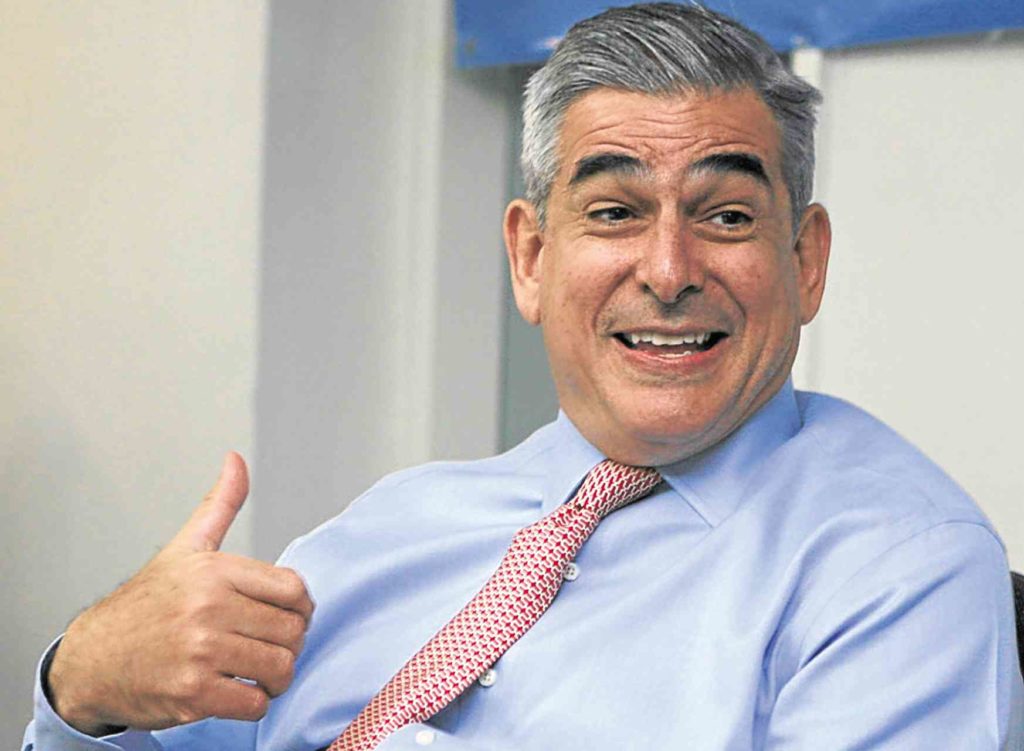Ayala Corp promises to bring down healthcare costs

Jaime Augusto Zobel de Ayala
Healthcare is an industry that is ripe for disruption and reinvention and with potential for “inclusive innovation” as the world grapples with an aging population, a growing number of chronic diseases, and greater demand for patient-centered care, according to business tycoon Jaime Augusto Zobel de Ayala.
The chair and CEO of Ayala Corp. recently received the 2018 Metrobank Professorial Chair for Public Service and Governance from the Ateneo Professional Schools and Metrobank Foundation. He was cited for “active commitment in providing affordable and accessible quality healthcare solutions which promote the government’s universal healthcare programs.”
In his speech, Zobel talked about the emerging disruption of traditional business models in a major effort to bring down the cost of healthcare and create better synergies. He cited the CVS Pharmacy-Aetna merger last year combining the largest pharmacy retailer in the US with a leading health insurance provider with the goal of integrating their pharmacy and financing capabilities and direct access to consumers.
Likewise cited was the partnership among Amazon, Berkshire Hathaway and JP Morgan to set up a healthcare company that would provide more cost-effective services for its workforce of over a million employees.
“Another area of disruptive innovation I foresee, will come with new technologies and discoveries in the field of gene sequencing and DNA testing. I am fascinated with how gene therapy has ushered in a new era of personalized medicine, where screening can identify genetic predispositions and treatment can be customized down to the molecular level,” Zobel said.
Article continues after this advertisementThe Ayala group, for its part, recognizes that healthcare is an integral part of the national agenda—not only as a component for progress, but as a fundamental right for all. As the domestic economy improves and with the middle class growing, the group also sees increasing demand and awareness of healthcare products and services.
Article continues after this advertisementBut the most compelling reason cited for the group’s investment in this sector, is that “from birth to death, from cradle to grave, Filipinos struggle with poor health outcomes,” Zobel said.
Through AC Health, the group seeks to improve healthcare by building an integrated healthcare ecosystem, with retail health services at the forefront, creating affordable, last-mile access to millions of Filipinos. The group envisions over 1,000 Generika pharmacies, 100 FamilyDoC clinics, and strategic partnerships with hospitals and specialty centers, tied together by innovative technology, to “create a seamless experience and an integrated network.”
FamilyDoc clinics follow a three-in-one retail model, providing pharmacy and laboratory services and primary care consultations offered at affordable price points and at convenient locations near residential communities.
By the end of this year, Zobel said FamilyDoc would have over 50 clinics, employing 120 primary care physicians and over 200 allied health professionals.
“We believe the private sector plays an important role in improving healthcare, collaborating among each other, filling gaps, developing new innovations, and offering services that are complementary to what the public sector can provide,” he said.
Generika Drugstore, through its network of over 750 pharmacies nationwide, offers access to quality generic medicines, with up to 85-percent savings versus branded equivalents.
Zobel added that through Globe’s KonsultaMD, users could get 24/7 access to a licensed doctor through their mobile phones. In the pharmacy retail space, he noted MedGrocer had created a convenient channel through its online platform and delivery of medicine.
AC Health has also developed its own in-house electronic medical records and clinical information system, which allows the group to utilize real-time data to improve efficiency and patient care at the FamilyDoc clinics. This also enables the group to perform extensive data analytics for population health, allowing AC Health to monitor health outcomes, incidence rates, and disease trends at the community level.
FamilyDoc also utilizes tele-radiology, through a third-party provider called LifeTrack. Through this platform, clinics are able to digitally send x-ray and ultrasound images to Lifetrack’s pool of certified radiologists, who are then able to give an official reading in as little as 15 minutes. These health technology solutions not only improve efficiency and provide cost-savings but also expand the reach of services, enable integration, and improve quality of care, Zobel said.
“The work that we do in healthcare is about improving lives. Ultimately, healthcare is about people. And while we are still in the very early stages of our healthcare business, I am encouraged with the many stories we have already begun to see, where you can really feel the impact one can have on our customers and patients.”